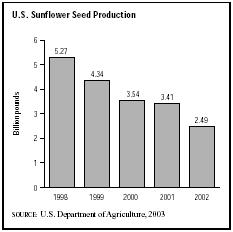SIC 2076
VEGETABLE OIL MILLS, EXCEPT CORN, COTTONSEED, AND SOYBEAN
This category covers establishments primarily engaged in manufacturing vegetable oils, cake, and meal, with the exception of corn, cottonseed, and soybean, or in processing such vegetable oils into forms other than edible cooking oils. Businesses primarily engaged in manufacturing corn oil and its byproducts are classified in SIC 2046: Wet Corn Milling; those refining vegetable oils into edible cooking oils are covered in SIC 2079: Shortening, Table Oils, Margarine, and Other Edible Fats and Oils, Not Elsewhere Classified; and those primarily refining these oils for medicinal purposes are discussed in SIC 2833: Medicinal Chemicals and Botanical Products.
NAICS Code(s)
311223 (Other Oilseed Processing)
311225 (Fats and Oils Refining and Blending)
Falling vegetable oil prices at the turn of the twenty-first century lessened oil's contribution to the value of seeds. This curtailed production of high-oil-content seeds such as rapeseed and sunflower seed in 2001-02. In fact, global rapeseed production declined from 13.6 million metric tons in 1999-00 to 13.1 million metric tons in 2000-01, and to 12.2 million metric tons in 2001-02.

Global sunflower seed production dipped from 9.6 million metric tons in 1999-00 to 8.3 million metric tons in 2000-01, and to 7.5 million metric tons in 2001-02.
Sunflowers can be processed using the same auto-mated presses as corn and soybeans, but they use less water and are drought resistant. These advantages, together with the Sunflower Seed Oil Assistance Program (SOAP), which helps to offset the competitiveness of highly subsidized European Community vegetable oils, helped overcome reduced levels of production and the loss of two major export markets in the early 1990s—Egypt and Russia—and boost U.S. sunflower seed oil exports in 1992 and 1993. However, by the late 1990s and early 2000s, U.S. sunflower seed production was on the decline, falling from 3.54 billion pounds in 2000 to 2.49 billion pounds in 2002.
Canola is the name for a group of rapeseed varieties, and accounts for the majority of rapeseed grown in the United States and Canada. As a relatively new contender in the United States, canola in the early 1990s faced an uncertain future, when the product was seen as one that might join the so-called specialty oils market—alongside such products as linseed oil, coconut oil, and walnut oil. However, in the late 1990s and early 2000s canola was sought after by increasingly health-conscious food and edible oil industries because of its low saturated fat content, which is the lowest among major vegetable oils. Most of the canola oil consumed in the United States is imported from Canada, and domestic use continued to increase as U.S. rapeseed consumption reached 649 million pounds in 2000, compared to 316 million pounds in the mid-1990s. Canola meal (originally known as rape-seed meal) has similar nutritional qualities to soybean meal, and it is often used as a cattle feed supplement. Canola was also likely to see increased industrial use, as a genetically-engineered variety of canola called high-lauric acid canola was being produced. Lauric acid, previously only available from coconut or palm kernel oil, is a key ingredient in soaps, detergents, lubricants, cosmetics, and confections.
The U.S. typically produces less than 10 percent of world sunflower seeds. Among international producers in 2001 and 2002, the Former Soviet Union and Argentina were the largest producers and exporters, producing 5.33 million metric tons and 3.70 million metric tons, respectively. Canada was the principal producer and exporter of canola, and palm oil was the most heavily traded oil in the world.
In 2001 world production of palm oil was 23.6 million metric tons, up from 16.9 million metric tons in 1998. Rapeseed oil followed with 13.1 million metric tons. Sunflower oil and coconut oil were 8.3 million metric tons and 3.4 million metric tons, respectively. According to the U.S. Department of Agriculture, U.S. imports of coconut oil, rapeseed oil, palm oil, and linseed oil were 477,467 metric tons; 241,586 metric tons; 165,107 metric tons; and 6,102 metric tons, respectively.
Further Reading
"New Record for Global Oilseed Output in 2003-04." Agra Europe, 28 November 2003.
U.S. Department of Agriculture, National Agricultural Statistics Service. "Statistics of Oilseeds, Fats, and Oils." Washington, DC: 2003. Available from http://www.usda.gov/nass/pubs/agr03/03_ch3.pdf .
Comment about this article, ask questions, or add new information about this topic: